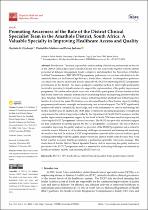Promoting awareness of the role of the district clinical specialist team in the Amathole District, South Africa: A valuable specialty in improving healthcare access and quality
Date
2022Author
Oyebanji, Oyebola G.
Mathole, Thubelihle
Jackson, Debra
Metadata
Show full item recordAbstract
Introduction: This study explored the understanding of healthcare professionals on the role of the District Clinical Specialist Team (DCST) and how the team works together with the district personnel at different management levels to improve and strengthen the Prevention of Motherto-Child Transmission of HIV (PMTCT) programme performance across four sub-districts in the Amathole district of the Eastern Cape Province, South Africa. Methods: An interpretive qualitative case study was used to understand the role played by the DCST in improving PMTCT programme performance in the district. We used a purposive sampling method to select eight participants involved in providing technical assistance to support the implementation of the quality improvement programme. We conducted in-depth interviews with all the participants; all were females in their mid-forties. Data were analysed thematically by identifying themes and reporting patterns within the data. Findings: Most interviewees were females in their mid-forties and had been at their respective facilities for at least five years. The findings were discussed based on three themes: capacity building, programme performance oversight and monitoring, and technical support. The DCST significantly enhances the staff’s clinical skills, knowledge, and work performance to care for and manage the mother and baby pair. In addition, the DCST plays a vital role in providing programme oversight and complements the technical support provided by the Department of Health (DoH) managers and the quality improvement programme support by the South to South (S2S) team aimed at improving and achieving the PMTCT programme’s desired outcomes. The DCST also provided additional support for data verification to identify gaps in the PMTCT programme. Conclusion: The role of DCST is essential in improving the quality and service provision of the PMTCT programme and is critical to assist the team at different levels in addressing challenges encountered and training and mentoring the needs of the staff. In addition, DCST’s responsibilities cannot be fully achieved without a good working relationship with the quality improvement and district health teams because they work better together to ensure that the programme is performing optimally. Take-home message: This study showed that the District Clinical Specialist Team is vital for improving the quality and service provision of the PMTCT programme and it is essential for addressing challenges encountered by healthcare facilities and the staff providing PMTCT services

